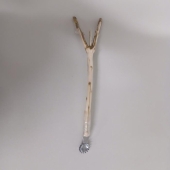


M Ljin wrote:As much as I agree with Paul’s answer to the issue, I still think the issue is likely to he different.
Paul suggests unemployment—I suggest that there will be a lot more jobs and they will be harder, more grueling, and less pleasant than today’s worky jobs. There will be a lot of jobs created in pollution management, power plants (of all kinds and fuels), in mental health management and treating AI-induced psychosis (because people won’t be forced to use their brains at all) and in general feeding the AI machine and cleaning up after it. The solution is still the same: live sanely.
There is a historical precedent, the Industrial Revolution. It took away the work of spinners, weavers, craftspeople of all sorts and started rolling out mass produced cloth, leading to lots of people losing their jobs. Then, the machine, even hungrier, had to pull a great chunk of the population out from the countryside and into the city for factory jobs. People weren’t satisfied with what the automated process could make, they wanted more! And so the machine got fed and now we’ve fast fashion and disposable clothes, a lot more worky work around and not much unemployment last I heard.


Lina Joana wrote:Wish I had a crystal ball.

Lina Joana wrote:
I can’t see this, or anything, preparing someone for 70% unemployment. For context, the height of the Great Depression saw 25% unemployment.
If it comes to that, there will either be a complete and utter collapse of society which will include the big businesses and AI (nobody to buy their products) or there will be a new economic model.
In the first scenario: How will the farmer who supposed to will his land to the skipper hang on to his land long enough to do so? How will he pay taxes when his bank crashes, taking his savings? How will he finish out farming when there is nobody who can afford to buy the crops he sells? Same questions apply even if you own land- how will you pay for electricity to run your well? How will you replace those 20-year lifespan solar panels? Or the well pump, or the excavator parts, or or or…
Upshot - lets hope this doesn’t happen. It is never a bad idea to own land, learn skills, and do a bit of “prepping”. But I personally don’t think that this will save you if we are talking full societal disintegration. Then again, I have never met a gert - only farmers trying hard to live by those principles, and finding it tremendously difficult. So maybe my perspective is incomplete.


Craig Weiser wrote:Even if AI/robots didn’t exist, the current standard of going to college for a wage so you remain in debt for the rest of your life makes no sense. Perhaps still viable for those who have a natural talent better than most. But for the rest of us, the very concept of giving up our time for money to service a lifelong debt in the suburbs must be reevaluated. So young people logically seek other options: can you live in poverty skillfully? Can you have sufficient shelter and community with minimal dependency on the currency? Has the definition of “work” always been sacrificing your time for money? Now here comes AI and fine labor robotics to exasperate the whole thing!


Les Frijo wrote:
paul wheaton wrote:I hear from many people (and see it all over the internet): gotta stop AI; gotta stop the bots ... "DEY TERK ER JERBS!" ... it strikes me as twisted to desire jobs so much.
I had huge hopes that we would embrace the scenario I laid out, and then explore permaculture solutions.
With a humble home and a huge garden ...
- maybe it doesn't matter if you lose your job
- maybe you have a MASSIVE advantage
- maybe all this stuff becomes interesting rather than scary
- is better than living in the city with a lot of money ... which will drain away
- maybe you can share your bounty with friends
Community seems the hardest thing to build and grow. Maybe the best thing that could happen is for jobs to go away and peeps will have no choice and more time for building community.
That would be interesting and exciting.


Pearl Sutton wrote:
Mike Barkley wrote:... when you think see a bunch of tiny ants roaming around on your kitchen counter. Only to realize that they are turnip seeds. Bag had a hole in it.
A variant on that I have done is when you sneak carefully to the counter, and beat a watermelon seed to death with a flyswatter.


Matt Todd wrote:Looks like you're asking about lavender specifically. I grew about 3 dozen plants from seed last year with NO stratification! In my studying before, I found a lot of growers saying it was not necessary for lavender and indeed it was not for me.
I filled 6 pack cells with sterilized 1:1:1 Sand, perlite, coir soil mix. Sterilized because lavender seedlings are very mold sensitive. 70-80 degrees with light 16 hrs/day. They sprouted in about 7 days. Keep moist for about one month after sprouting (until roots are established). Pot up at 6 or more leaves.


Riona Abhainn wrote:Some of this depends on your grow zone too, in some places its still winter.


Pearl Sutton wrote:...when you attempt to deny your inherent redneckiness by claiming this is an artistic photo, staged just for the effect that I wanted to photograph, yeah, that's it!!
Ok, maybe I'm a permie and I'm taking advantage of the warm weather to wash my flannel sheets.... :D And drying them on the cattle panel arch arbor that grows beans and squash...
Function stacking! Solar energy!! Artwork! That's it!!
or maybe it's just laundry.
:D